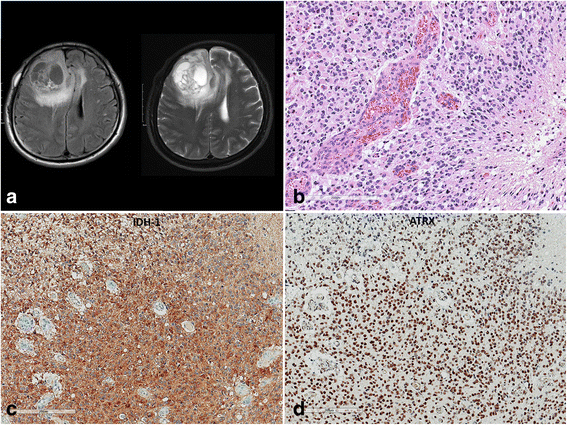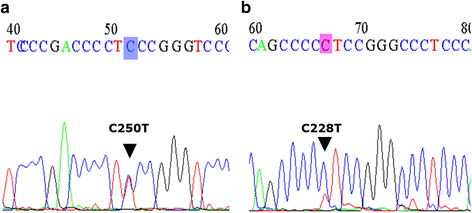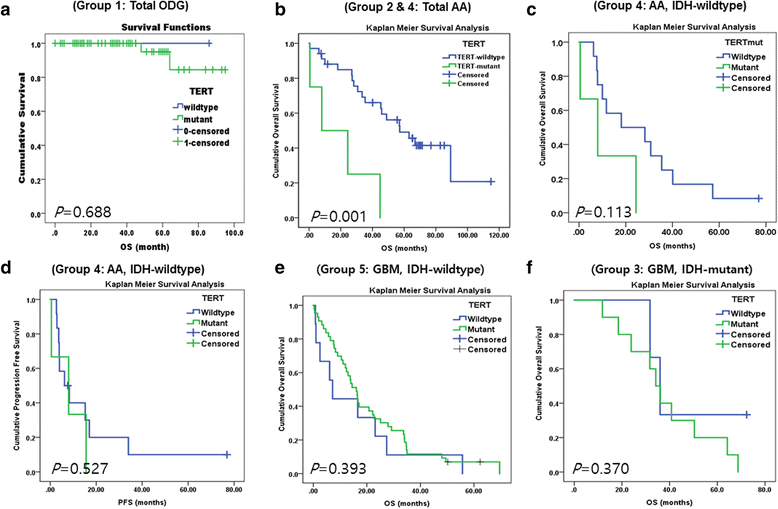The frequency and prognostic effect of TERT promoter mutation in diffuse gliomas
- PMID: 28851427
- PMCID: PMC5574236
- DOI: 10.1186/s40478-017-0465-1
The frequency and prognostic effect of TERT promoter mutation in diffuse gliomas
Abstract
Mutations in the telomerase reverse transcriptase gene promoter (TERTp) are common in glioblastomas (GBMs) and oligodendrogliomas (ODGs), and therefore, have a key role in tumorigenesis and may be of prognostic value. However, the extent of their prognostic importance in various gliomas is controversial. We studied 168 patients separated into five groups: Group 1: 65 patients with ODG carrying an IDH1 or IDH2 mutation (IDH-mutant) and 1p/19q-codeletion, Group 2: 23 patients with anaplastic astrocytoma (AA), IDH-mutant, Group 3: 13 patients with GBM, IDH-mutant, Group 4: 15 patients with AA, IDH-wildtype (WT), and Group 5: 52 patients with GBM, IDH-WT. TERTp mutations were found in 96.9%, 4.4%, 76.9%, 20.0%, and 84.6% of patients in Groups 1, 2, 3, 4, and 5, respectively. The R132H mutation in IDH1 was found in 60.5% (23/38) of patients in the AA cohort (Groups 2 and 4) and 20.0% (13/65) of patients from our GBM cohort (Groups 3 and 5), whereas all patients with ODG (Group 1) had a mutation either in IDH1 (n = 62) or IDH2 (n = 3). Using Kaplan Meier survival analysis, we found that the TERTp mutation was correlated with poor overall survival (OS) in Groups 2 and 4 combined (P = 0.001) and in Group 4 (P = 0.113), and in multivariate analysis, the TERTp mutant group was associated with significantly poor survival in Group 5 (P = 0.045). However, IDH mutation, MGMT methylation, and younger patient age (<55 years old) were significantly correlated with favorable OS (all P < 0.05) in our cohort of astrocytic and ODGs. In patients with ODG (Group 1), mutant IDH and TERTp did not have prognostic value because these mutations were universally present. Based on the revised 2016 WHO classification of gliomas, we found that TERTp mutation was frequently present in patients with GBM or ODG and because it was strongly correlated with poor survival outcome in patients with IDH-WT GBM in multivariate analysis, it may be of prognostic value in this subgroup of patients with gliomas.
Keywords: Alpha-thalassemia/mental retardation syndrome X-linked (ATRX); Anaplastic astrocytoma; Glioblastoma; Isocitrate dehydrogenase (IDH); Oligodendroglioma; Telomerase reverse transcriptase.
Conflict of interest statement
Ethics approval and consent to participate
This study followed the principles of the World Medical Association Declaration of Helsinki and it was approved by the Institutional Review Board of SNUH (IRB No.: 1307-093-505).
Competing interests
The authors declare that they have no competing interests.
Publisher’s Note
Springer Nature remains neutral with regard to jurisdictional claims in published maps and institutional affiliations.
Figures






References
-
- Andersson U, Osterman P, Sjostrom S, Johansen C, Henriksson R, Brannstrom T, Broholm H, Christensen HC, Ahlbom A, Auvinen A, et al. MNS16A minisatellite genotypes in relation to risk of glioma and meningioma and to glioblastoma outcome. Int J Cancer. 2009;125:968–972. doi: 10.1002/ijc.24363. - DOI - PubMed
-
- Arita H, Narita Y, Fukushima S, Tateishi K, Matsushita Y, Yoshida A, Miyakita Y, Ohno M, Collins VP, Kawahara N, et al. Upregulating mutations in the TERT promoter commonly occur in adult malignant gliomas and are strongly associated with total 1p19q loss. Acta Neuropathol. 2013;126:267–276. doi: 10.1007/s00401-013-1141-6. - DOI - PubMed
MeSH terms
Substances
LinkOut - more resources
Full Text Sources
Other Literature Sources
Medical
Research Materials
Miscellaneous

